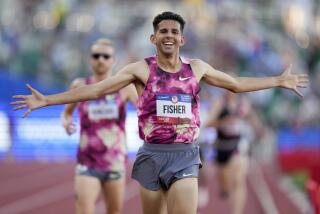U.S. Fencing Hopes Are Resting With Bravin : Profile: At 20, Hamilton High graduate is youngest U.S. foil champion in history.
- Share via
It has been a year of thrills for fencer Nick Bravin. And they just keep coming.
The California State Legislature plans to introduce an official resolution of commendation, and he received a letter of congratulations from Vice President Dan Quayle.
But for Bravin, the thrill of thrills is fencing well, the very thing that is getting him all the attention.
“For me, fencing well and fencing to my best ability is the most thrilling, most exciting thing about it,” Bravin said.
And, he has been fencing well.
At 20, he is the youngest U.S. men’s foil champion in history. He recently returned from the Pan American Games in Cuba with a bronze medal, the highest individual-competition finish among the U.S. squad.
“Honestly, I would be happy to fence and lose if I thought I fenced my best,” said Bravin, a 1988 graduate of Hamilton High. “Right now I know that fencing well is kind of an implication of the future. Winning nationals and all that is good, but it’s not the highest I’m going to go.
“In Cuba, there was one match where I think I fenced a great bout. I fenced this guy (Oscar Garcia) from the Cuban team, and they’re the world champions and beat us 9-1. I fenced really well and he fenced really well. I lost the bout, 5-1. But I was completely satisfied that I did my best.
“I know that if I fence at that level against anyone in the world, I’m going to have a chance to win. This was a sign of that. What was more important than winning at this point was showing the other fencers of the world that I’m someone they’re going to have to be concerned with.”
If Bravin’s summer showed anything, it’s that the rap-music-listening, renaissance-poet-reading Stanford senior spears the U.S. fencing hopes of the future. Along with winning the U.S. championship in July, Bravin finished ninth at the World Championships, had a successful preliminary round in the World University Games (he eventually faltered and finished 25th) and won the bronze at the Pan Ams with an 11-2 record.
After Bravin won his national title, Quayle sent him a personalized congratulatory letter. Not to be out-congratulated, the California State Legislature had an official resolution drafted to recognize Bravin’s accomplishment. A back-log of legislation has the resolution on hold.
“I suppose at some point in time I’ll look back on the letters and stuff and be nostalgic,” Bravin said. “But right now, its no big deal.”
The Bravin family lineage has lots of fencers in it, running all the way back to his grandfather, who was an accomplished international competitor. More recently, Nick’s brother Jess fenced at Harvard. Nick became involved with the sport at age 12.
“I got involved, because like all little brothers, I worshipped my older brother,” Bravin said. “He fenced so I started fencing. I remember at first it wasn’t any fun because all you are doing is drilling and you don’t get to fight. And it was like an hour drive up to a lesson. My mom used to tell me, all the time, that I was going to quit. So I used to kind of do it to spite her.
“To this day it’s the only thing I’ve started and haven’t dropped.”
Bravin does not have a lot of international experience: he competed in only four international matches in the past two years. However, in junior competition, he is rated among the top 20 fencers in the world.
In collegiate competition, he was the 1990 NCAA men’s foil champion, the 1989 NCAA Western Regional Champion and the Pacific 10 Conference champion in 1989 and ’90. Stanford named him its sophomore athlete of the year in 1989. He also won gold medals in the men’s foil competition at the 1989 and 1990 U.S. Olympic Festival.
“I think that this year I should be able to break into the top 32 or 24 fencers,” Bravin said. “I’ve gotten a lot better a lot faster in the past year. . . . Definitely by 1996, I should be in a position to medal at the Olympics.”
Although time is on Bravin’s side--fencers often compete into their 30s--he will have to overcome the sport’s provincial nature, where judges may help teams from their own region, in order to succeed.
“It’s a known thing that Europeans protect each other,” Bravin said. “Even though the Germans hate the Dutch and everyone hates one another as teams, they protect each other from those countries which are more independent.
“They get a lot of questionable calls and things seen their way. I’m not saying they outright cheat, although sometimes they do, but that they get the benefit of the doubt in cases that can determine the outcome of a bout. They protect the people who are supposed to be at the top. You have to be so clean, that they can’t cheat you, if you want to win.”
More to Read
Go beyond the scoreboard
Get the latest on L.A.'s teams in the daily Sports Report newsletter.
You may occasionally receive promotional content from the Los Angeles Times.






